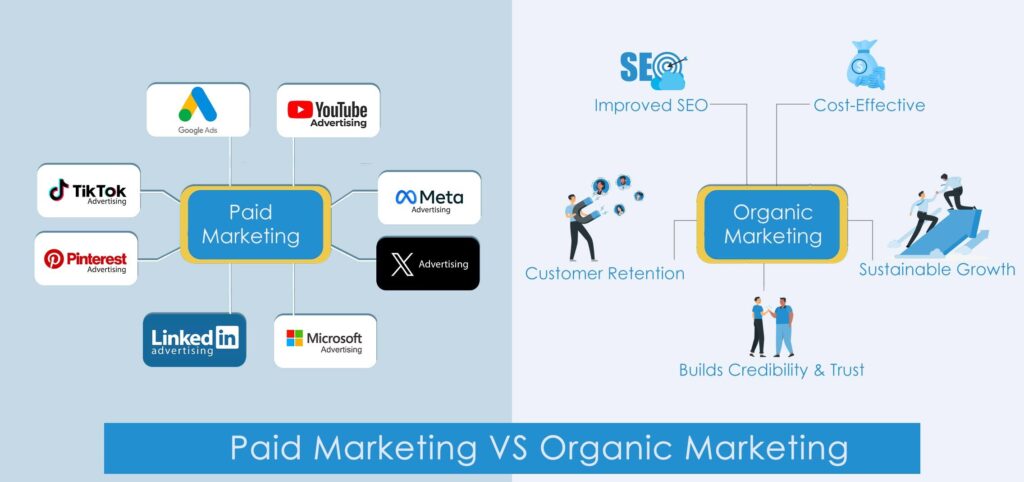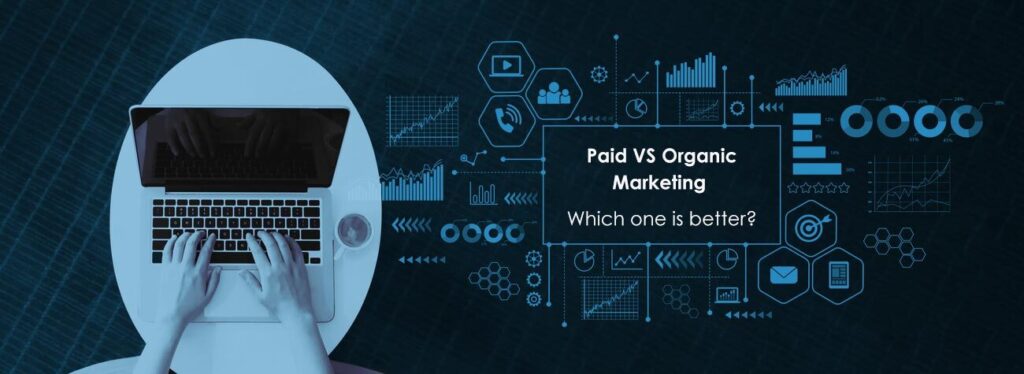Paid VS Organic Marketing

The marketing landscape has changed drastically over the past few years thanks to technological advancement and the internet. More people browse and shop online than physically. With this change in consumer behavior, businesses have also evolved to meet their target customers’ needs.
While the change has brought its fair share of risks, there are now more opportunities than ever. Businesses come up with different strategies to grab opportunities and avoid risks. Their goals can range from reaching potential customers to increasing engagement and boosting conversion, or business growth.
Marketing is one of those strategies that businesses take to reach their objectives. It is a broad term involving activities and strategies to promote products, services, or ideas. Organic and paid are two types of marketing often used. You must understand the difference between these two marketing to know which one is best suited for your business.
Let us explore what paid and organic marketing means and do an in-depth dive between paid vs organic marketing!
Organic Marketing
The digital marketing strategy that generates traffic without any paid advertisements or other direct promotions, is known as Organic marketing. It includes free online marketing tools and methods that appeal to online users and interact with businesses naturally. These types of marketing rely on SEO, social media, and other channels.
Organic marketing helps businesses to increase brand awareness and develop authentic connections. They can use different ways to attract leads and convert users. This type of marketing is focused on the long term to convert the website visitors into paid customers. One of the benefits of visitors organically coming to your website is that you can retarget them.
You can measure the organic marketing effectiveness by analyzing the traffic the content drives to the website. Similarly, you can measure the lead that a campaign generates and channels that bring the highest amount of highly converting traffic to your website.
Fonts work wonders on any design. Click here to read about the best free fonts for UI/UX designs.
Benefits of Organic Marketing
1. Builds credibility and trust
One of the benefits of organic marketing is that it helps businesses to build credibility and trust with their customers. When you provide informative and relevant content that resonates with your customers, they connect with your business personally. Customers also actively engage and trust the information. Similarly, it also helps to build customer loyalty.
2. Cost-effective
Organic marketing is more cost-effective than paid marketing. Rather than purchasing advertisement space, organic marketing focuses on creating valuable content and building relationships with potential customers. Similarly, it focuses on search engine optimization, building a loyal following, and long-term benefits.
3. Improved SEO
Organic marketing works with the help of SEO. Therefore, it is important to optimize your content to boost the visibility. Your content can be blogs, videos, and social media posts. You can optimize your content by creating high-quality and relevant content using keywords. It helps your content rank higher in the search engines and social media platforms.
4. Sustainable growth
Another benefit of organic marketing is its sustainable growth. It has a long-lasting impact, unlike paid marketing. This type of marketing takes a longer time to yield results. In other words, it focuses on long-term sustainable growth. The high-quality content helps to improve the visibility in search engines slowly which then steadily generates organic traffic.
5. Customer retention
Organic marketing focuses on creating trust and credibility with customers for the long term. It involves creating community and engaging with customers. It enhances the customer experience and builds stronger relationships. Similarly, it also helps to attract new customers. Therefore, organic marketing plays an important role in customer retention.
Paid Marketing
Paid marketing, also known as inorganic marketing is another form of marketing that includes purchasing advertisement space. This kind of marketing relies on bringing traffic from paid advertisements. Unlike organic marketing, paid marketing is a sales-focused marketing with immediate results. It immediately reaches its target, engages with them quickly, and quickly covert audiences.
The most common paid marketing tactics involve buying clicks from social media platforms, search engines like Google, sponsored posts, video ads, display ads, etc. Similarly, this marketing is effective in reaching new and potential customers. It involves targeting specific demographics, interests, locations, etc to ensure it reaches its target audiences.
Paid marketing is flexible when it comes to building strategies. Additionally, paid marketing provides detailed analytics and reporting for businesses to measure the results of their campaigns. You can measure the results through conversion rates, return on ad spend (ROAS), driving campaigns, etc.
Benefits of Paid Marketing
1. Faster results and visibility
As we mentioned above, paid marketing yields faster results. It reaches the target customers quicker and provides immediate visibility. Paid marketing helps to increase engagement and attract potential customers. It gives instant exposure of products and services to the customers. Similarly, the use of various advertising platforms further boosts the exposure. This visibility helps to bring traffic to the website.
2. Measurable and flexible
Unlike organic marketing, paid marketing is more flexible and can be more accurately measured. You can customize the strategies and campaigns to suit the tastes and preferences of the target customers. Although you need to purchase the advertising space, you can still control your marketing budget. It also facilitates automated bidding.
Paid marketing provides data metrics like impressions, clicks, conversions, etc. Similarly, you can count the cost-per-click (CPC) and cost-per-acquisition (CPA) to measure the campaign’s cost-effectiveness. You can also monitor the marketing’s performance with data visualization.
3. Adaptability and optimization
The adaptability and optimization of paid marketing is one of its benefits. The market trend is volatile. Similarly, the tastes and preferences of customers also change with time. Paid marketing responds to the changes and improves the strategies and campaigns accordingly. Marketers can quickly adjust, modify their marketing budgets, and change their target audiences.
Similarly, you can diversify the platforms and make real-time adjustments based on customers’ preferences. As paid marketing platforms provide detailed analytics, it is easier to optimize. The adaptability and optimization of paid marketing enhance the effectiveness of the advertising strategy.
4. Global reach
Global reach is one of the benefits of paid marketing. It provides businesses with the means of connecting with audiences across the world. Paid marketing helps businesses to create a presence in international markets. They can customize their advertisements and content in multiple languages for diverse audiences. Likewise, the campaigns can adapt to local culture and preferences to connect with the audiences. It helps businesses with strategic expansion and creates a strong international presence.
Paid VS Organic Marketing – Which one is better?
Now that we know about paid and organic marketing and its benefits, the question remains paid vs organic marketing, which one is better?

To use organic or paid marketing depends on your goals, budget, and target audiences. Both marketings are used for different purposes. While one focuses on long-term results, the other focuses on generating quick results.
There is one other option you can take, i.e., to use both marketing. Businesses often use this hybrid method to maximize the benefits of each marketing approach. It helps to create a balanced marketing campaign. You can get immediate visibility and engagement from paid marketing while building a long-term relationship with your customers.
Conclusion
As you can see from above each marketing has its benefits and limitations. Both types of marketing are suitable for different goals. Combining both can be the most effective marketing approach in some cases.
Therefore, understand your goals, budget, and target audiences before selecting either type of marketing or a combination of both. If you have any thoughts on paid vs organic marketing, do let us know!








One thought on “Paid VS Organic Marketing”